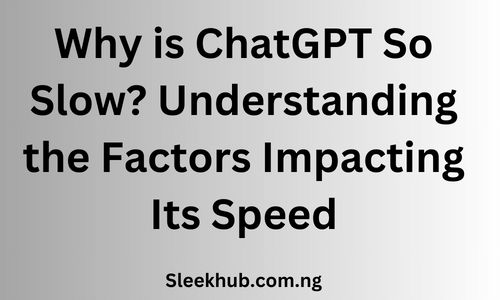In recent months, ChatGPT has taken the world by storm with its impressive natural language processing capabilities. However, many users have noticed that ChatGPT can be frustratingly slow at times. If you’ve wondered “Why is ChatGPT so slow?“, you’re not alone. Let’s look at some of the key factors that impact ChatGPT’s speed and performance.
Technical Limitations of the GPT Architecture
One of the main reasons ChatGPT may be slow is due to the inherent technical limitations of the GPT (Generative Pre-trained Transformer) architecture it is built upon. The GPT architecture is incredibly complex and requires processing massive amounts of data. This can lead to latency issues, especially when the system is under heavy load from many users making requests simultaneously.
Additionally, as OpenAI releases more advanced versions of the model, like GPT-4, computational requirements increase even further. GPT-4 has a much larger context size than its predecessors, allowing it to consider more information when generating responses. While this leads to higher quality outputs, it also demands more computational resources, which slow response times.
Impact of high traffic and server errors
Like any online service, ChatGPT’s performance is impacted by high traffic volumes and server errors. When a large number of users access ChatGPT at the same time, it can overload the servers and lead to slower response times. This is a common challenge faced by many popular web applications.
Furthermore, server errors stemming from software bugs, hardware issues, or network problems can also cause ChatGPT to become sluggish or unresponsive. When a server error occurs, it disrupts the system’s smooth operation and causes delays for users.
The Need for Massive Computational Resources
Generating human-like text based on complex language models requires immense computational power. ChatGPT is a large model with billions of parameters. Running such a model efficiently necessitates a robust hardware infrastructure with ample processing capacity, memory, and storage.
If the underlying hardware is not powerful enough or bottlenecks exist in the system architecture, slower performance can result. Balancing ChatGPT computational demands with cost-effective infrastructure is an ongoing challenge for OpenAI developers.
Potential Solutions and Future Improvements
While dealing with a slow ChatGPT can be frustrating, there are some potential solutions and future improvements on the horizon. On the user side, simple troubleshooting steps like reloading the page, clearing browser cache, or trying again during lower traffic periods can sometimes help.
For developers leveraging the ChatGPT API, optimizing code efficiency, batching requests, and fine-tuning models for specific use cases can improve performance. As OpenAI continues to refine the underlying models and infrastructure, we can expect ongoing improvements in speed and reliability.
The bottom line
ChatGPT is an incredibly powerful language model that is constantly evolving. While slowdowns and performance hiccups can be frustrating, they are expected given the technology complexity. OpenAI is working hard to optimize the system and deliver a faster, smoother experience for users.
In the meantime, some patience and understanding can go a long way. ChatGPT’s occasional sluggishness is a small price to pay for access to such a transformative AI tool. As the technology matures and the infrastructure scales, we can look forward to a future where interactions with ChatGPT are consistently fast and seamless.


great!